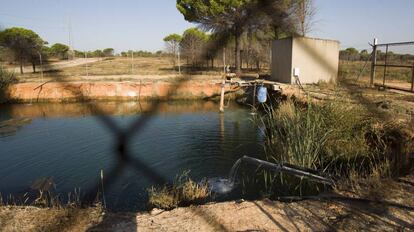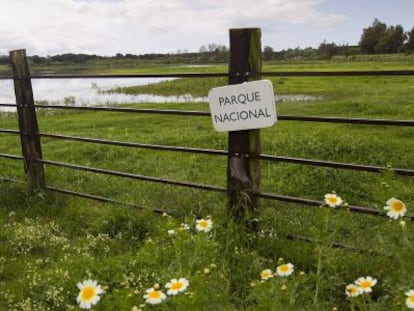Madrid blames climate change for deterioration of Do?ana preserve
The EU is threatening sanctions if measures are not adopted to protect one of Europe¡¯s most important natural spaces


It isn¡¯t the intensive agriculture, or the lack of alternative water resources, or the pressure from construction and tourism. It¡¯s not even all the illegal irrigation.
What¡¯s causing the deterioration of Do?ana, in southern Spain, is climate change. At least according to the Spanish government, which partly blames global warming for the state of the natural preserve.
In response to a EU ultimatum to end the overexploitation of water resources in one of Europe¡¯s most important natural spaces, the Popular Party (PP) administration has drafted a report listing 43 initiatives to be completed between now and 2027 at a cost of €430 million.
The CHG is promising to adopt a technique for ¡°the teledetection of irrigation¡± between this year and the next
Madrid notes that it has already purchased an estate and sealed off 50 wells, out of 400 slated for closure.
On April 28, the European Commission issued a two-month deadline for Spain to adopt effective measures or face a case before the EU Court of Justice. The EC describes the Do?ana marshlands as ¡°one of the few remaining wild regions in Europe, and without doubt the most important site in Europe for migratory birds.¡±
The European decision questioned the efficiency of measures adopted to date, their scientific rigor and even their allocated budget.
A water transfer
The key element in preventing the use of ground water by the region¡¯s strong agricultural sector is the series of water transfers planned for the near future. Around 4.99 cubic hectometers of water from Andalusia¡¯s Atlantic coast are slated to be brought over to Do?ana, with one further cubic hectometer of surface water, all of which would cover the needs of 724 hectares of land.
The investigation began in 2009, when European authorities noted that protected areas in Do?ana were deteriorating through the overuse of ground water in agriculture and tourism, most notably at the popular seaside resort of Matalasca?as.
Now faced with infringement proceedings, the Spanish government has drawn up a report to avert sanctions. EL PA?S has had access to this report, which was drawn up by the Guadalquivir Water Confederation (CHG), the government agency in charge of water management in the area.
The 43-page report asserts that ¡°it cannot be ruled out that the process of global change triggered by climate change is not already having a direct effect on Do?ana.¡± The document goes on to list several observable phenomena throughout the last 32 years, such as a 0.5% drop in average annual rainfall, or a rise in temperatures of one degree Celsius every 13 years between April and June.
At the same time, the CHG denies that there has been an increase in illegal water use this year compared with 2015, and insists that it has shut down 50 wells. Of these, 11 are within the bounds of Los Mimbrales, an estate in Huelva province that the state paid €50 million for.
The CHG denies that construction and tourism are affecting the park, and is promising to adopt a technique for ¡°the teledetection of irrigation¡± between this year and the next. The agency also says it has carried out 209 inspections and issued sanctions in 700 of the 900 hectares of land that do not meet the government¡¯s irrigation regulations.
Sign up for our newsletter
EL PA?S English Edition has launched a weekly newsletter. Sign up today to receive a selection of our best stories in your inbox every Saturday morning. For full details about how to subscribe, click here.
But the EC says that controlling irrigation is ¡°not enough¡± to prevent habitat deterioration, and adds that urban development is ¡°the main factor¡± in water extraction in some areas.
¡°The increase in the volume of ground water extracted for irrigation and for the tourist industry has led to the drying-out of a number of lagoons in the special protection area,¡± said the EC in a press release.?¡°The Commission considers that the Spanish authorities have failed to take the necessary steps to prevent the pollution, the deterioration of habitats and the disruption of the bird fauna in the Do?ana region.¡±
English version by Susana Urra.
Tu suscripci¨®n se est¨¢ usando en otro dispositivo
?Quieres a?adir otro usuario a tu suscripci¨®n?
Si contin¨²as leyendo en este dispositivo, no se podr¨¢ leer en el otro.
FlechaTu suscripci¨®n se est¨¢ usando en otro dispositivo y solo puedes acceder a EL PA?S desde un dispositivo a la vez.
Si quieres compartir tu cuenta, cambia tu suscripci¨®n a la modalidad Premium, as¨ª podr¨¢s a?adir otro usuario. Cada uno acceder¨¢ con su propia cuenta de email, lo que os permitir¨¢ personalizar vuestra experiencia en EL PA?S.
?Tienes una suscripci¨®n de empresa? Accede aqu¨ª para contratar m¨¢s cuentas.
En el caso de no saber qui¨¦n est¨¢ usando tu cuenta, te recomendamos cambiar tu contrase?a aqu¨ª.
Si decides continuar compartiendo tu cuenta, este mensaje se mostrar¨¢ en tu dispositivo y en el de la otra persona que est¨¢ usando tu cuenta de forma indefinida, afectando a tu experiencia de lectura. Puedes consultar aqu¨ª los t¨¦rminos y condiciones de la suscripci¨®n digital.










































